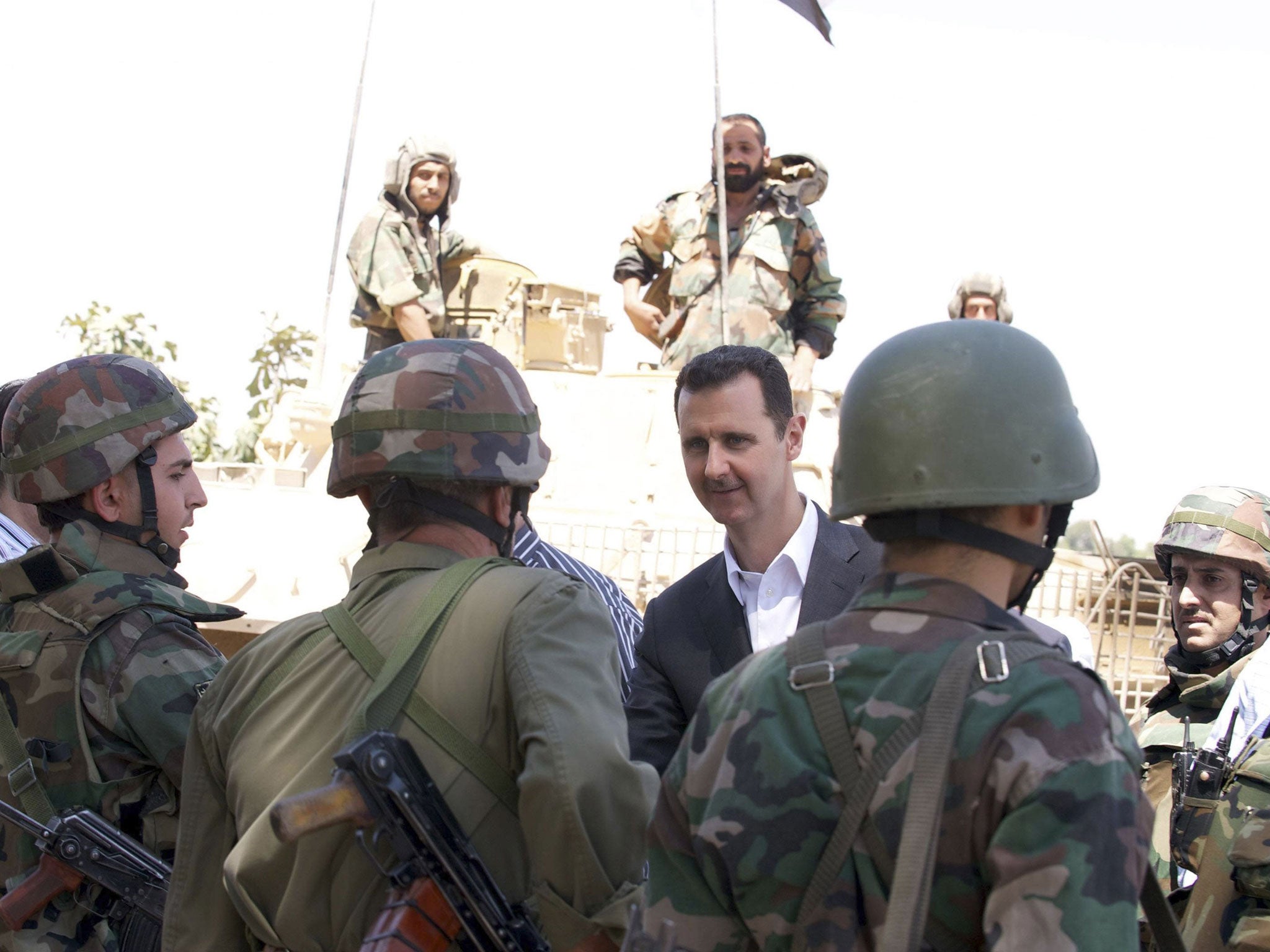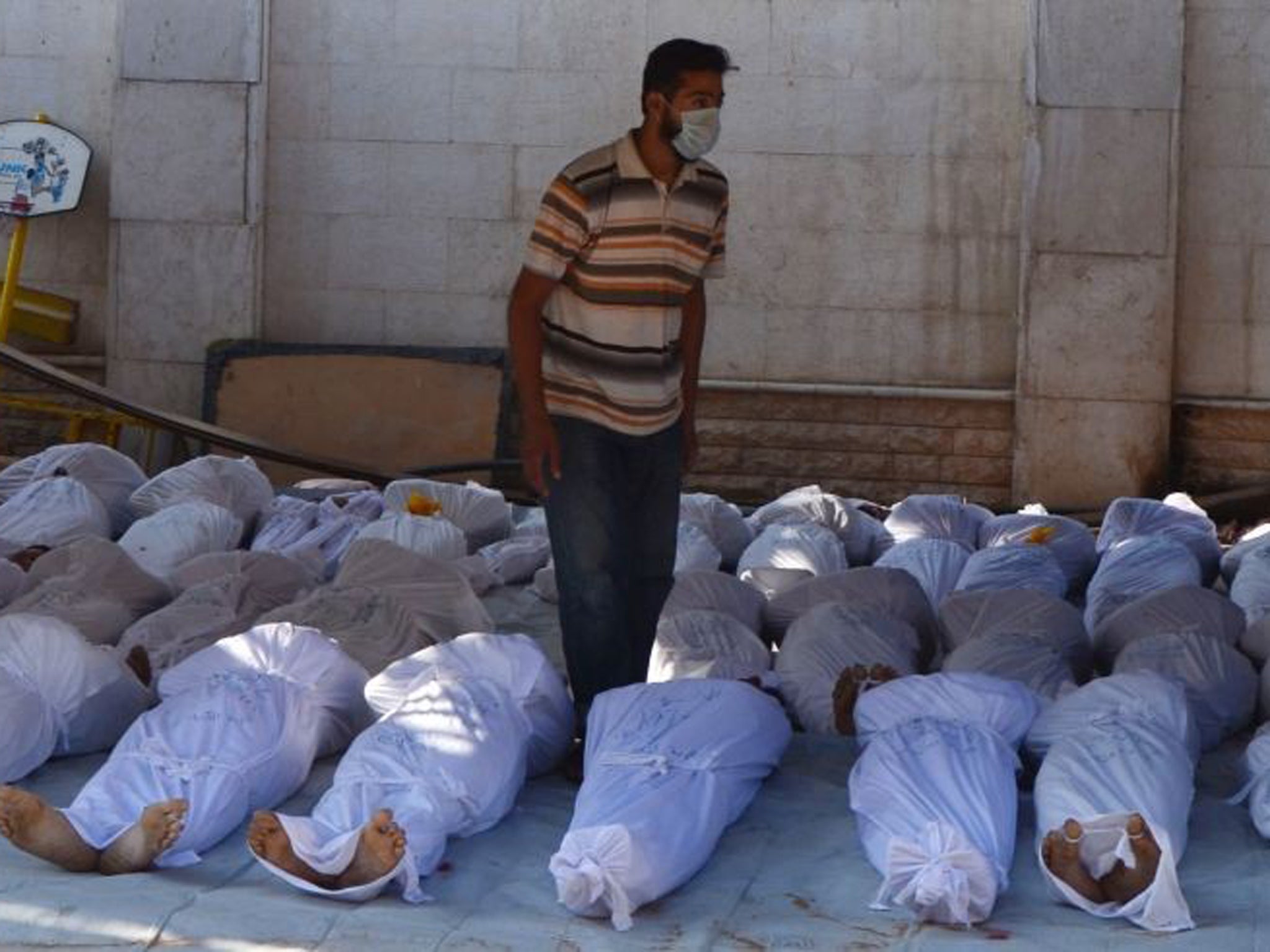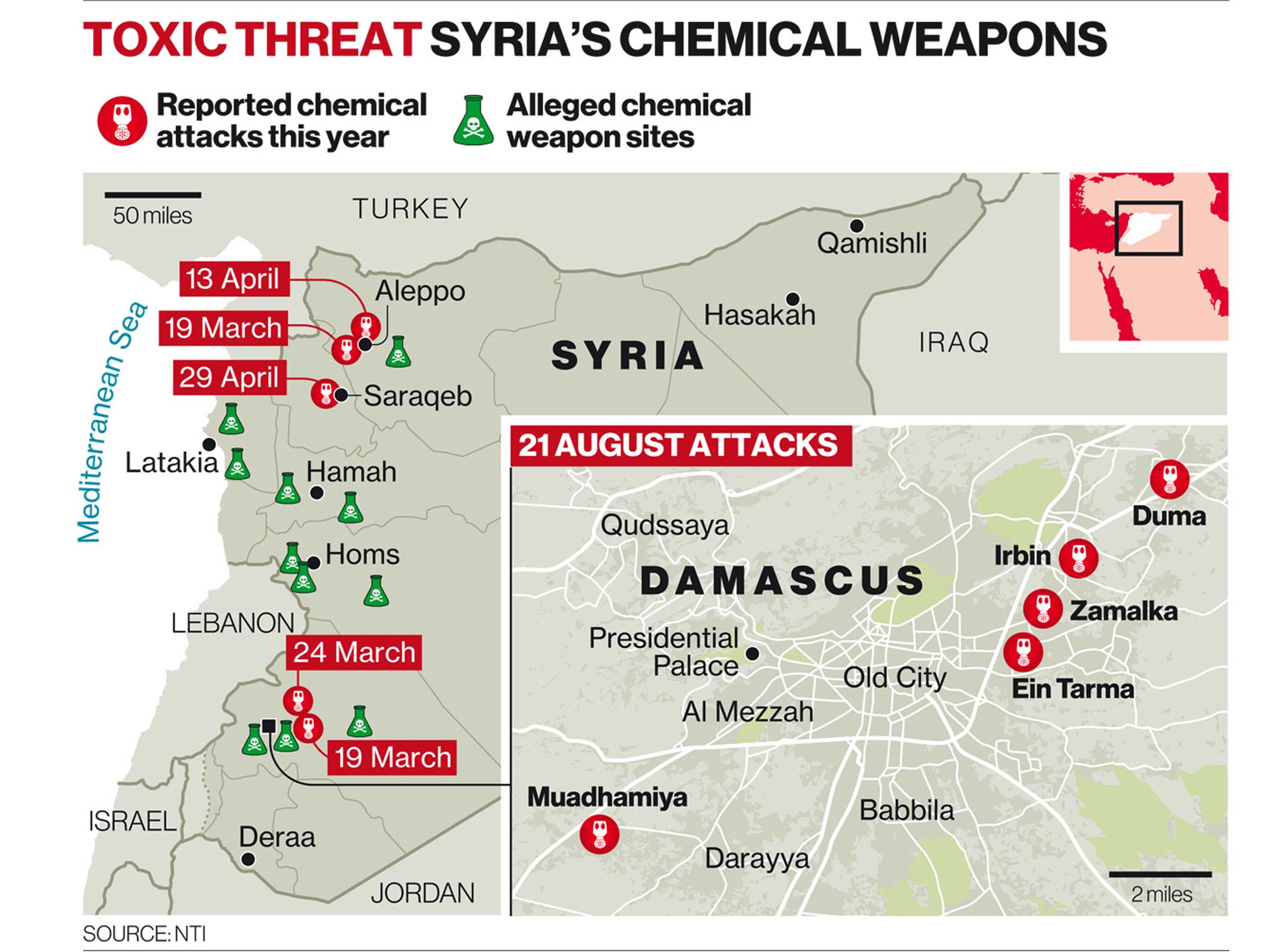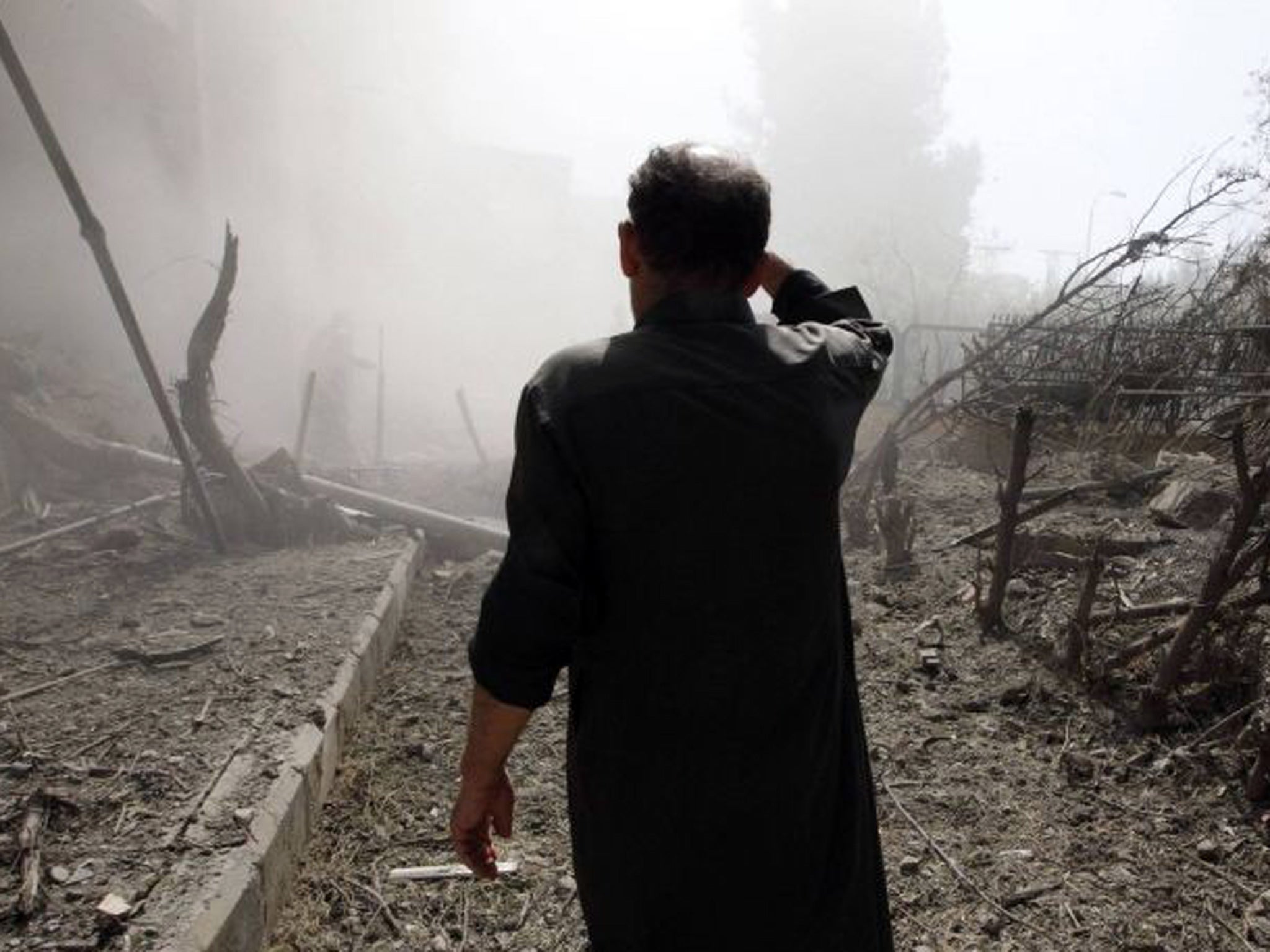Syria's darkest day? Opposition blames Assad forces as up to 1,300 killed in ‘poison gas attacks'
Many of the Damascus victims were very young children, even babies

Your support helps us to tell the story
From reproductive rights to climate change to Big Tech, The Independent is on the ground when the story is developing. Whether it's investigating the financials of Elon Musk's pro-Trump PAC or producing our latest documentary, 'The A Word', which shines a light on the American women fighting for reproductive rights, we know how important it is to parse out the facts from the messaging.
At such a critical moment in US history, we need reporters on the ground. Your donation allows us to keep sending journalists to speak to both sides of the story.
The Independent is trusted by Americans across the entire political spectrum. And unlike many other quality news outlets, we choose not to lock Americans out of our reporting and analysis with paywalls. We believe quality journalism should be available to everyone, paid for by those who can afford it.
Your support makes all the difference.The victims were laid out in a hospital, on beds and on the tiled floor, their eyes lifeless and staring. Many of them were very young children, even babies. Others were in convulsion, mouths foaming, as medics frantically tried to save them, using hand-pump respirators.
These were the scenes from videos showing, it was claimed by the Syrian opposition, the devastating aftermath of a massacre of more than 1,300 people by Bashar al-Assad's forces using chemical weapons in Ghouta, east of Damascus.
The regime has denied the allegations, accusing “terrorists and their supporters” in the international media of disseminating false propaganda. Such recriminations have become standard in the vicious civil war. But, for the first time since reports of the use of weapons of mass destruction began to circulate, there is now a United Nations inspection team not only inside the country, but in the vicinity of the affected area. It arrived in the Syrian capital on Sunday after months of negotiations with the regime to investigate three occasions where chemical agents have, allegedly, been used in the past.
One of these was at the village of Khan al-Assal near Aleppo where the two sides in the conflict accused each other of carrying out the attack resulting in 26 deaths; the location of the other two sites has not been confirmed.
A number of Western states, including Britain, the US and France, asked the UN team to investigate the latest deaths. Following a closed-door emergency meeting tonight, the UN Security Council said it needed clarification on the attacks, but made no explicit call for a probe by the team in Syria. “There is a strong concern among council members about the allegations and a general sense that there must be clarity on what happened and the situation must be followed closely,” said Argentina's UN ambassador, Maria Cristina Perceval, after the meeting. Russia and China had opposed language that would have demanded a UN probe.
Earlier, the British Foreign Secretary, William Hague, said that if the claims were verified they would “mark a shocking escalation in the use of chemical weapons”. “I hope this will wake up some who have supported the Assad regime to realise its murderous and barbaric nature,” he added later. Russia had backed up the Assad regime's denials, by saying the attack looked like a rebel “provocation” to discredit him.
The French President François Hollande declared it was imperative that the team be allowed “to shed full light” on what had taken place and the German Foreign Minister Guido Westerwelle demanded that the inspectors be given immediate access.
The head of the 20-strong team of inspectors, Ake Sellstrom, a scientist from Sweden, said in Damascus: “It sounds like something that should be looked into. It will depend on whether any UN member state goes to the Secretary General and says we should look at this event. We are in place to do so.”

What happened was recent enough for the inspectors to be able to form a view on what had happened, according to specialists on chemical warfare. Such a development may have a major impact on the course of the conflict.
Evidence that the regime has indeed used WMDs, with such a massive number of fatalities, would greatly strengthen the hands of those pressing for large-scale supplies of advanced weapons to the rebels.
Evidence that the footage was fabricated would further dent the already fragile credibility of the disjointed opposition and weaken the position of their Western sponsors.
Ghazwan Bwidany, a doctor treating the casualties, held that the symptoms indicated the use of sarin gas. “It may be sarin, most probably it is sarin” he said. “We don't have the capacity to treat all this number of people. We're putting them in mosques, in schools. We are lacking medical supplies now, especially atropine, which is the antidote for chemical weapons.”
Bayan Baker, a nurse at the Douma Emergency Collection facility, initially put the death toll at 213. “Many of those affected are women and children. They arrived with their pupils dilated, cold limbs and foam in their mouths. The doctors say these are typical symptoms of nerve gas victims.”

Local co-ordination committees of activists in the area said the numbers killed had risen to 1,360, while George Sabra, the deputy chief of the Syrian National Coalition, the main umbrella group of the opposition, announced a figure of 1,300. He said: “This is the coup de grâce which kills all hopes for a political solution in Syria. This is not the first time they have used chemical weapons, but it constitutes a significant turning point; this time it was for annihilation rather than terror.”
However, there are questions as to why the regime would want to have recourse to WMDs at a time when it was making gains using conventional arms and with the knowledge that UN inspectors were present in the country. “If you look at the way they have sought legitimacy through having the UN team there, in a carefully orchestrated fashion, with the help of the Russians and the Iranians, the use of chemical weapons does not make sense,” said a European diplomat.
Robert Emerson, a security analyst, added: “Assad has not been doing too badly in the publicity stakes with the excesses of Islamists among the rebels like the cannibal commander, et cetera. Deploying WMDs at this stage would be a hell of an own goal.”

Jean Pascal Zanders, a senior research fellow at the EU Institute for Security Studies in Paris, was also puzzled as to why the regime would carry out such an attack with UN experts there. But he continued: “It is clear that something terrible has happened. The scenes could not have been stage-managed. None of the victims appeared to have external wounds from blast, shrapnel or bullets. The footage seems to offer more convincing evidence of poisoning through asphyxiation - witness the pinkish-bluish hue on the faces of some of the fatalities. Further elements that seem to confirm exposure to toxicants are the unfocused and rolling eyes, severe breathing difficulties and possible signs of urination or defecation on trousers.”
Rebels wouldn’t back intervention, insists US general
The Obama administration is opposed to even limited US military intervention in Syria because it believes the rebels fighting the Assad regime wouldn’t support American interests if they were to seize power right now, according to the chairman of the Joint Chiefs of Staff. Effectively ruling out US cruise missile attacks and other options that wouldn’t require US troops on the ground, General Martin Dempsey said in a letter to a congressman that the military is clearly capable of taking out President Assad’s air force and shifting the balance of the Arab country’s two-and-a-half year war back towards the opposition.
But he said such an approach would plunge the US deep into another war in the Arab world and offer no strategy for peace in a nation plagued by ethnic rivalries.
“Syria today is not about choosing between two sides but rather about choosing one among many sides,” General Dempsey said in the 19 August letter to Eliot Engel. “The side we choose must be ready to promote their interests and ours... Today, they are not.”
AP
Join our commenting forum
Join thought-provoking conversations, follow other Independent readers and see their replies
Comments